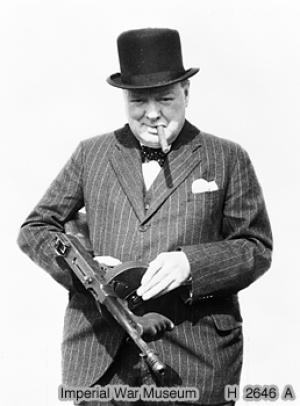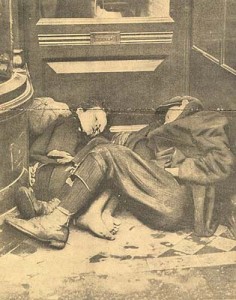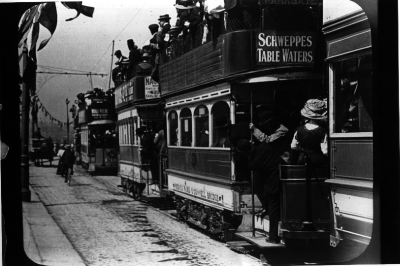
‘Where you have what we call sweated trades, you have no organisation, no parity of bargaining, the good employer is undercut by the worst… where those conditions prevail you have not a condition of progress, but a condition of progressive degeneration’
(Winston Churchill, President of the Board of Trade, introducing the Trade Boards Act to the House of Commons on April 28th, 1909. This was the forerunner of the Joint Labour Committee system)
As Churchill predicted the growing power of employers and dismantling of protection for employees has certainly seen ‘progressive degeneration’ grow apace in Ireland in recent years. The victory of Cork businessman John Grace and his Fried Chicken business in Cork’s appropriately named Cook Street, certainly drove a nail into the legislation designed to prevent sweatshops emerging again in our cities and towns. (more…)
Padraig Yeates on July 14, 2011 | Filed Under Industrial Relations | Comments Off on Irish Constitution saves sweatshop employers from Winnie
Gerry Kavanagh in the National Library spotted this photograph published in La Miroir, Paris, on November 23rd, 1913. The caption reads ‘La Misere á Dublin’.

They could be brothers or a father and son. A couple of years ago people would have been shocked at a reminder of how bad things were in Dublin at the beginning of the last century. Today such pictures are a reminder that society can regress as well as progress. Images of the past can also signal the future.
Padraig Yeates on June 28, 2011 | Filed Under History | Comments Off on La Misere á Dublin – a lost photograph

SIPTU General President Jack O'Connor and Ken Fleming (centre) at inaugural meeting of National Ports Committee in Liberty Hall on June 8th, 2011.
SIPTU is getting back to its roots with the formation of a National Ports Committee to represent dock workers. There are still companies in Irish ports refusing to recognise unions, pay the National Minimum Wage or even pay some ship’s crews any wages!
The Committee will work with seafarers and British port workers to fight for better conditions, union recognition, where it is denied, and to end abuse onshore and at sea. The union’s General President Jack O’Connor told the shop stewards they were pioneering the union’s new drive to organise workers in the current economic crisis.
(more…)
Padraig Yeates on June 9, 2011 | Filed Under Industrial Relations | Comments Off on SIPTU Returns to Roots to combat exploitation in Irish Ports
In the 1960s and 1970s Yugoslav President Josip Broz Tito commissioned a series of major monuments by leading artists to commemorate the country’s struggle against fascism in the Second World War. Young Pioneers visited them as part of their political education, so did millions of Yugoslavs and tourists. Now Yugoslavia no longer exists but the monuments still stand, abandoned. The battles and concentration camps they commemorate did happen – two million people did perish – and they make our various ‘wars’ look like playground tiffs.
A powerful elite in Ireland would like us to forget that 1913 ever happened. Ideally, they would also like unions to disappear. Would Jim Larkin’s statue in O’Connell Street and James Connolly’s in Beresford Place then be relegated to the same status as these monuments?
Click on link to see Yugoslav monuments.
Some are awesome, some are awful. All are becoming increasingly meaningless.
Padraig Yeates on May 22, 2011 | Filed Under Art | Comments Off on Can we commemorate a forgotten past?
Romania – Talks on National Agreement breaks down but Collective Bargaining Rights remain in place
Talks on a new Four Year National Collective agreement in Romania are deadlocked over proposed increases in the Minimum Wage. Employers object that it is too high. What else is new? But for Irish observers the really interesting thing is the way Collective Bargaining Rights are underpinned in one of the EU’s newest accession states, compared with here.
(more…)
Old 1913 Ballad found.
The words of this song were given to Brendan Byrne of the Labour History Society at a SIPTU May Day seminar in Athy by Mary Hoare Walsh. It was composed by local boatmen to commemorate events during the Lockout and came from a local boatman, Thomas McCormack of Allenwood South. He worked on the Barrow and Grand Canal network until the 1960s. The ballad obviously relates to events around the Basin at Guinness’s Brewery in Dublin and on the Grand Canal, which was a major conduit taking shipments of stout down the country. Can anyone help identify the people or incidents referred to?
‘The Big Strike of 1913’
‘Oh! James’s Street did echo to Larkin’s bugle call
And for the rights of Irishmen, we rallied one and all
Those tyrants Tuke and Allen we left in sad array
When they closed the Gates behind us, we struck for higher pay (more…)
Padraig Yeates on May 4, 2011 | Filed Under Music and Song | Comments Off on The Big Strike of 1913
Keith Ewing, Professor of Public Law at King’s College, London, says Ireland is in breach of its obligations on facilitating workers who want collective bargaining under International Labour Organisation conventions – http://www.youtube.com/watch?v=Y7a2lQzJDWM
See Irish Congress of Trade Union link below for interview with Esther Lynch, Head of Legal and Social Affairs, ICTU
Padraig Yeates on May 3, 2011 | Filed Under Industrial Relations | Comments Off on Ireland in breach of International Labour Law obligations
Almost 1,000 years after the Battle of Clontarf we are still paying the price for opting out of the Nordic way of doing things. Not just when it comes to oil exploration but union recognition.
The Norwegian Confederation of Trade Unions has used the threat of sympathetic strikes and a boycott of its products to force a company selling workwear to sign a collective bargaining agreement. This followed a three year battle for recognition. The unions initially approached Bekken & Strøm AS in 2008 but it resisted every step of the way and was not bound by national agreements because it was not affiliated to any employer organisation.
It was finally forced to recognise the United Federation of Trade Unions (Fellesforbundet) and the Norwegian Employees in Commerce and Offices (HK) union because Norway recognises the right of workers to use tactics that are illegal here. (more…)
Padraig Yeates on May 2, 2011 | Filed Under Industrial Relations | Comments Off on Vikings (should) Rule
1913 Committee – Reclaiming Our Past – Proclaiming Our Future!
Bulletin 1 April 2nd, 2011 (Tram Strike Day -876)
Join Us On Our Journey

We are on the eve of a decade of centenaries in Ireland, beginning with the Ulster Crisis in 1912 and concluding with the Civil War in 1922-3. There will be much retrospection, showers of pious platitudes and a host of spurious heirs claiming ownership of the past.
The 1913 Committee wants to do something different and this bulletin is our tocsin. We do not believe 1913 was a mere curtain raiser for ‘1916 and All That’. On the contrary, the issues on which Irish – and British – workers, feminists and radical nationalists challenged the consensus of wealth and privilege on these islands are at least as relevant today as events in the GPO or on the Somme in 1916.
(more…)
Padraig Yeates on April 2, 2011 | Filed Under Uncategorized | Comments Off on Bulletin No 1
[The Hugh Gegarty Memorial Lecture, presented to the Irish Labour History Society by Dr. Conor McCabe, 11 March 2011.]
Introduction
In September 1911 the ASRS called a strike which saw ten per cent of the strikers laid off in an overt and unapologetic act of victimisation undertaken by the chief director of the GSWR, Sir William Goulding.
Whereas in Britain successful strike action had led to increased membership and the formation of the NUR and the Triple Alliance, in Ireland trade union development on the railways was frozen, and remained so for the next five years.
The hardline stance taken by Goulding in 1911 made the similar stance taken by William Martin Murphy in 1913 all the more viable. (more…)
Conor McCabe on April 2, 2011 | Filed Under History | Comments Off on The 1911 Railway Strikes




